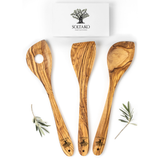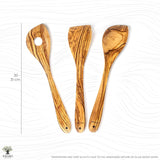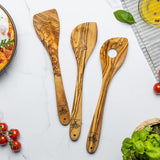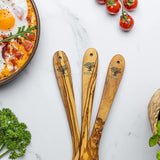KEIN MIKROPLASTIK MEHR IM ESSEN
Beim Erhitzen oder Schneiden können kleine schädliche Mikroplastik Teile abgetragen und in unser Essen gelangen. Olivenholz hat sich in den letzten Jahren als vielversprechende Alternative zu Plastik und anderen Holzarten etabliert. Es bietet viele Vorteile gegenüber Plastik, sowohl aus ökologischer als auch aus gesundheitlicher Sicht. Olivenholz ist sehr langlebig und robust, was bedeutet, dass es nicht so schnell abgenutzt wird wie Plastikküchenutensilien. Dies reduziert wiederum das Risiko der Freisetzung von Mikroplastikpartikeln.
Darüber hinaus hat Olivenholz natürliche antibakterielle Eigenschaften, die dazu beitragen können, Bakterienwachstum auf der Oberfläche des Holzes zu hemmen. Im Vergleich dazu kann Plastik Bakterien Ansammlung und Wachstum fördern, was dazu führen kann, dass die Utensilien schneller ausgetauscht werden müssen.

Unser Olivenholz



Exklusives Holz

Farbenprächtig

Lebensmittelecht

Antibakteriell

Pflegeleicht
WARUM OLIVENHOLZ EINE GUTE ALTERNATIVE ZU PLASTIK IST
Olivenholz hat sich in den letzten Jahren als vielversprechende Alternative zu Plastik etabliert. Es bietet viele Vorteile gegenüber Plastik, sowohl aus ökologischer als auch aus gesundheitlicher Sicht.
Olivenholz ist eine nachhaltigere Alternative zu Plastikküchenutensilien, da es aus einem erneuerbaren Rohstoff hergestellt wird und biologisch abbaubar ist. Olivenbäume wachsen in trockenen Gebieten und benötigen kein zusätzliches Bewässerungssystem. Auch die Verwendung von Olivenholz als Material für Küchenutensilien oder andere Gegenstände trägt zur Reduzierung von Holzabfällen bei, da es normalerweise aus Bäumen gewonnen wird, die für die Produktion von Olivenöl bereits gefällt wurden. Im Gegensatz dazu ist Plastik ein nicht erneuerbarer Rohstoff und kann Jahrhunderte brauchen, um abgebaut zu werden.

FAQ's

FAQ's
Nein, Olivenholz-Küchenutensilien sind nicht für die Verwendung in der Spülmaschine geeignet. Das Holz kann durch den heißen Wasserdampf und die starken Reinigungsmittel beschädigt werden.
Um die Lebensdauer von Olivenholz zu erhalten, ist es wichtig, es regelmäßig zu pflegen. Zunächst sollte Olivenholz von Hand gewaschen und gründlich abgetrocknet werden. Vermeide es, Olivenholz für längere Zeit in Wasser einzulegen, da dies das Holz beschädigen kann. Um Olivenholz vor Austrocknung und Rissen zu schützen, wird empfohlen, es regelmäßig mit Öl zu pflegen. Verwende Olivenöl, Sonnenblumenöl oder Mineralöl. Trage das Öl dünn auf die gesamte Fläche des Holzes auf und entferne überschüssiges Öl mit einem Tuch.
Das Loch in unseren Löffeln hat einen praktischen Zweck. Es verringert den Widerstand und erleichtert das Rühren von Teigen, Saucen und anderen Zutaten. Zudem ermöglicht die spitze Ecke des Löffels ein einfaches Erreichen schwer zugänglicher Stellen in Töpfen und Pfannen.
Dank des hohen, natürlichen Ölgehalts nehmen Küchenutensilien aus Olivenholz weder Gerüche noch Verfärbungen an. Eine regelmäßige Pflege durch Einölen mit Speiseöl oder Olivenöl sorgt für langanhaltende Schönheit und Schutz. So bleiben die Löffel nicht nur funktional, sondern auch optisch ansprechend.
Olivenholz hat einen charakteristischen und angenehmen Duft, der von vielen Menschen als leicht süßlich oder würzig mit einem Hauch von Olivenölduft beschrieben wird. Der von Natur aus hohe Ölgehalt im Holz vermeidet, dass sich Gerüche im Holz absetzen.
Die Entscheidung für Olivenholz-Küchenutensilien anstelle von Plastik-Küchenutensilien bringt eine Vielzahl von Vorteilen mit sich. Im Gegensatz zu Plastik, das während des Kochens Mikroplastik freisetzen kann, bieten Olivenholz-Utensilien eine nachhaltige Alternative ohne schädliche Partikel. Zusätzlich zu ihrer umweltfreundlichen Eigenschaft sind sie von Natur aus antibakteriell, langlebig und ästhetisch ansprechend. Mit Olivenholz-Küchenutensilien kannst Du nicht nur deine Gesundheit und die Umwelt schützen, sondern auch stilvoll und nachhaltig kochen.




































